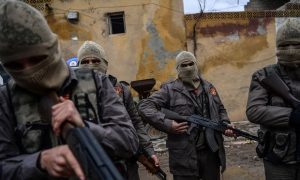Ankara is retraining a core of fighters to wage its own war against Isis and Kurdish expansion
The young rebel from Idlib rolled down his sock to reveal a deep, blackened gash, a grim memento of weeks as an Islamic State captive. The man who tortured him in that prison was on his mind when he heard that Turkey was offering military training to 500 men, and decided to sign up.
Like all the recruits to Ankara’s latest experiment, he was a seasoned anti-Assad rebel with battlefield experience but no military education. Turkey promised to drill and discipline them, creating the nucleus of a new Syrian rebel army.
“They told us: ‘You have been fighting for six years, God bless you, but we want to train you to be soldiers’,” the former prisoner said. Like all Syrian fighters and officials who agreed to interviews about the latest offensive, he spoke on condition of anonymity because of the sensitivity of relations with Turkey.
After a month at a training camp near Antakya in 2016, they were sent back to fight in al-Bab, an Isis-dominated town over the border. The graduates, along with some others who would later train in Turkey, would come to be known by other Syrian rebels as “the Turkish army’s auxiliary force”, and last week they were called into action by their backers, playing a prominent role in a new Turkish offensive into Syria.
Their aim is to dislodge US-backed Kurdish militias from the enclave of Afrin, which lies on the border with Turkey. The groups are the Syrian wing of the Kurdistan Workers’ party (PKK), which has fought a decades-long insurgency against the Turkish state. The Kurds won Washington’s support when they took on a key role in the battle for Raqqa, but Ankara has long protested at the alliance.
The decision to cross over into Syria, and directly intervene in the seven-year-long civil war, has underlined the depth of Turkey’s concern about Kurdish fighters inside Syria. But it has also thrown Ankara’s ambitious training project into relief. According to rebel commanders, Turkey has for nearly two years been supporting the build-up and training of a unified army in Syria capable of resuming the battle against President Bashar al-Assad, now in the ascendant in the long civil war.
The genesis of the idea came in the opening months of Turkey’s first military campaign into Syria, when it launched Operation Euphrates Shield in the summer of 2016. Its troops had orders to both oust Isis from key border towns and limit the Kurdish militias’ westward expansion.
After taking the town of Jarablus near the border, Turkey sought to augment the Euphrates Shield forces – a disparate coalition of rebel militias – with a cadre of trained fighters to tackle Isis and guard the frontiers against Kurdish forces.
Rebel officials say the training programme has continued, building up Euphrates Shield into a force of 10,000 to 15,000 battle-ready soldiers, with an additional 10,000 recent recruits. After major military losses to Assad and his Russian and Iranian allies, the rebels see this force as a lifeline that could allow them to relaunch their waning insurgency. That rebel army, they say, could wage a campaign to eliminate al-Qaida-linked fighters who dominate the opposition-controlled province of Idlib, and go on to fight Assad again.
“We cannot accept military defeat, we have to reinforce and start over,” said one rebel official. “Euphrates Shield is against both terrorism and the regime, and it is the first step to build a state.” But their prime aim of unseating Assad seems increasingly divergent from their Turkish patrons’ focus on attacking Kurdish troops, meaning the force may ultimately amount to nothing but another proxy militia under a foreign power’s command – much like most other groups fighting in Syria.
“The [moderate] rebels previously didn’t establish themselves as useful proxies for other internationals,” said Sam Heller at the Century Foundation thinktank. “As a result, they were driven to the margins.”
The idea of a unified force dates back to the start of the armed opposition, but chronic divisions, and foreign powers backing rival factions, stalled its creation. In September 2017, hit by military setbacks, dozens of rebel groups got behind a national army project set up by the interim opposition government, a cabinet based in Syria with limited powers, which formally administered areas held by Euphrates Shield forces.
Turkey has quietly continued to support the project as it has grown into multiple divisions led by Syrian commanders who coordinate with Turkish officers, and who are spearheading the campaign in Afrin now. Therein lies the dilemma of the rebels leading the ground assault. Abandoned by all their international allies, they see no choice but to follow Turkey’s lead.
While they agree with the rationale of the Afrin campaign, they also hope that taking the Kurdish enclave will open up a ground corridor into Idlib that would allow the national rebel army its first test against their greatest enemies – Assad’s regime, and Hayat Tahrir al-Sham (HTS), the former wing of al-Qaida in Syria. Turkey has given them no promises of support for this. Its actions after the Afrin campaign will determine whether it has helped build up the rebel army to be its own proxy force, or to fight against the regime.
“We have to play on the differences between global powers negotiating in Syria,” said one rebel commander, whose group is not in Afrin but intends to join the national rebel army. “It is a strategic interest to open the ground corridor into Idlib, and it coincides with Turkish interests.”
The rebel who trained in Turkey said: “I would rather go fight [HTS] and the regime, but the Turks are the only ones who stood by us. How can I take on [HTS] and the regime by myself, without any allies?”
https://www.theguardian.com/world/2018/jan/27/syrian-rebels-gamble-turkish-alliance-fight-kurds-assad




